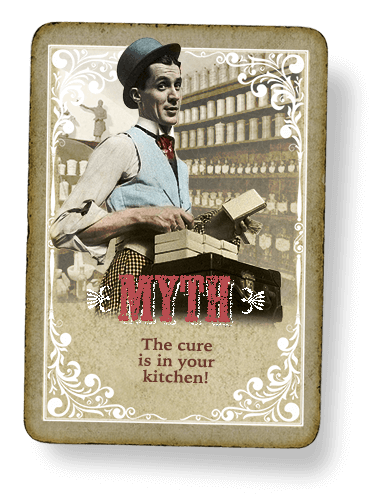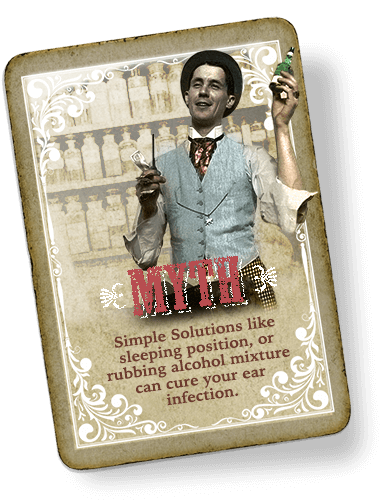Busting myths about earaches
Mythbuster: Will those old-time home remedies—or just some time—cure your earache?
Pressure or pain in your ear makes it hard to sleep, hard to concentrate, and hard to do just about anything. If you or your child has an earache, you want to help ease the pain and discomfort as quickly as possible. Read more to understand what causes earaches and whether home earache remedies can help. When you want an expert opinion, your local Urgent Care center is open seven days a week to help.
Earache or Ear infection?

Reality
Many people believe that an earache is an earache and that all are signs of an infection. You could experience ear pain or pressure when you have a sore throat or cold. Other causes include a build-up or impacted ear wax and changes in air pressure. A toothache or other dental issue can lead to referred pain in your ear due to proximity.
Even if it is an ear infection, it may be localized in a different part of your ear, caused by different factors. An outer ear infection can be from water trapped in your ear canal (you may have heard of this as a swimmer’s ear). When the tubes in your middle ear are blocked by fluid build-up, because of a cold, allergies, or a sinus infection, that can also cause an infection called otitis media.
Over-the-counter earache medicine

Reality
Ibuprofen, acetaminophen, or naproxen can all help relieve ear pain. An over-the-counter decongestant or antihistamine can help if your earache is caused by a virus or allergies. For many adult earaches, this may be a sufficient treatment plan. Speak to your healthcare provider about which over-the-counter medicines are appropriate for you or your child.
If your ear infection is caused by bacteria, and not a virus, a course of antibiotics is needed. A Urgent Care provider can determine whether an antibiotic should be prescribed.
Home remedies for earaches

Reality
Some folk remedies used for earaches include things you may have in your pantry. Usually, these remedies are used to reduce pain or swelling. Ginger is thought to have anti-inflammatory properties, so applying ginger juice-infused oil to the outer ear is believed to reduce swelling and pain. Garlic and onion are also believed to help draw out infection. None of these are scientifically proven, though there are chemical compounds in all three that are anti-inflammatory.
One folk remedy that does carry weight in the scientific community? The American Academy of Pediatrics suggests warm olive oil drops may be moderately effective in reducing ear pain. You should discuss any home remedies with your healthcare provider before attempting. Remember, even if the pain is reduced, any infection caused by bacteria will need antibiotics.
Other earache solutions

Reality
Some simple remedies can help lessen pressure or pain. Sleeping upright may encourage any fluid in your ear to drain. A warm or cool compress put over the affected ear can be soothing. A 1:1 mixture of water and hydrogen peroxide or rubbing alcohol and vinegar can help dry water trapped in the ear, which can lead to a swimmer’s ear. However, if an infection is present, only antibiotics can treat the cause and not just relieve the symptoms.
Earaches in children

Reality
It is true that ear infections are more common in younger children. Children’s eustachian tubes (the part of the ear that helps drain fluid) are both smaller and not as angled as an adult’s. As people age, the eustachian tubes grow bigger and reach an angle that improves draining. This lessens—but doesn’t eliminate—the frequency of earaches and ear infections from fluid build-up as people age.
Additionally, not all earaches are caused by fluid buildup. Adults can experience ear pain from TMJ, dental issues, and other illnesses beyond those which cause fluid build-up.
Treating an ear infection

Reality
Earaches not caused by bacterial infections may clear up on their own and an antibiotic wouldn’t be prescribed. You can take a wait-and-see approach but if symptoms haven’t improved or worsened over 24 - 48 hours, scheduling an appointment at your local Urgent Care center can help you determine the best next steps. New symptoms, like the ear oozing pus-like fluid or blood, severe pain that appears and then stops, headache, dizziness, high fever, swelling, or if you suspect a foreign object is in your ear are reasons to see a healthcare provider as soon as possible.
Written by Sarah Thebarge, Physician Assistant


